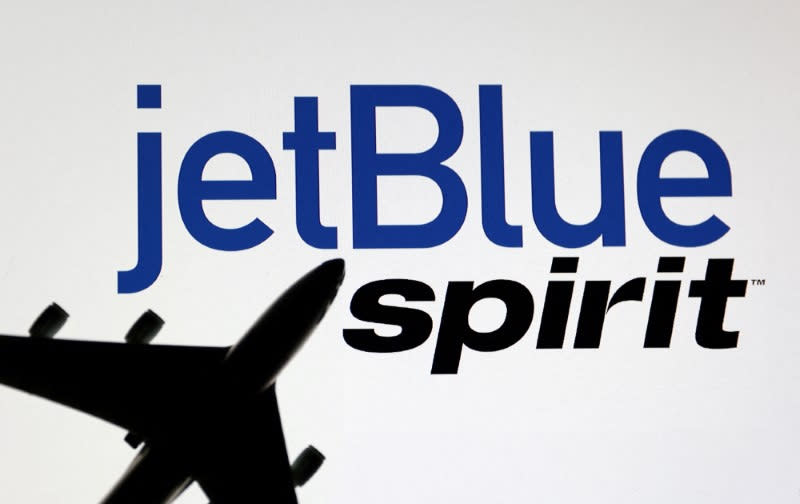Spirit Airlines sinks after judge blocks JetBlue acquisition
BOSTON (Reuters) - A federal judge on Tuesday blocked JetBlue Airways' planned $3.8 billion acquisition of ultra-low cost carrier Spirit Airlines after agreeing with the U.S. Department of Justice that the combination would be anticompetitive.
JetBlue's lawyers had called the case a "misguided" challenge to a merger of the nation's sixth- and seventh- largest airlines, which combined would control 10.2% of a domestic market dominated by four larger airlines.
Spirit's shares fell about 5% in premarket trading on Wednesday, after closing down about 47% on Tuesday after the ruling. JetBlue shares were steady after ending about 5% higher.
The ruling by U.S. District Judge William Young in Boston marked a victory for the White House in its efforts to prevent further concentration of the U.S. airline industry and raises questions about the viability of another recently proposed deal, Alaska Air's acquisition of Hawaiian Airlines.
President Joe Biden, who has made boosting airline competition a top priority, called the ruling "a victory for consumers everywhere who want lower prices and more choices."
The ruling finding the deal violated U.S. antitrust law also called into question Spirit's future. The ultra-low-cost carrier has struggled to turn a profit amid a run-up in operating costs and persistent supply chain problems.
Young said that while a combined JetBlue-Spirit would likely place "stronger competitive pressure" on larger carriers that dominate the domestic airline market, "the consumers that rely on Spirit's unique, low-price model would likely be harmed."
He said the deal would eliminate Spirit's low fares and its ability to put pressure on other higher-priced airlines, including JetBlue, to cut prices. Rivals on average cut prices 7% to 11% when Spirit enters a market, he said.
"The government has demonstrated that consumers value Spirit flights as a unique, economical product option," Young wrote. "The removal of Spirit as an option for consumers, therefore, would constitute a cognizable harm."

The airlines can appeal the ruling. In a joint statement, JetBlue and Spirit said they were evaluating "next steps as part of the legal process."
In a note to employees on Tuesday, JetBlue CEO Robin Hayes and chief operating officer Joanna Geraghty added, "One way or another, be assured: JetBlue has a bright future.
"If we need to move forward without Spirit, we will invigorate our standalone organic plan, continuing to fight for more market share and win customers from the big airlines."
They said "conditions remain difficult for smaller airlines like ours. We need everyone’s support to get back to profitability."
U.S. Attorney General Merrick Garland called the ruling "a victory for tens of millions of travelers who would have faced higher fares and fewer choices had the proposed merger between JetBlue and Spirit been allowed to move forward."
While Young ruled in the Justice Department's favor, he did not go as far as the government had asked and broadly bar any combination of the two companies, saying he was only going to block the deal "as it currently stands."
The judge, who had questioned whether further asset divestitures could make the deal work, said, "The courthouse doors remain open, should the defendant airlines decide to try again."
Some investors and analysts had expressed concerns in the past that Spirit's troubles could hurt JetBlue after the merger. Some analysts had also suggested JetBlue renegotiate the deal, citing the fall in Spirit's share price even before Tuesday's ruling.
The Justice Department, along with Democratic state attorney generals from six states, had said that allowing JetBlue to absorb its no-frills, budget rival Spirit would "extinguish a vital source of low-cost competitive disruption along more than 375 routes," causing nearly $1 billion of net harm a year to consumers.
The four larger U.S. carriers - United Airlines, American Airlines, Delta Air Lines and Southwest Airlines - control 80% of the market after a series of airline mergers the federal government blessed.
Spirit was the first U.S. domestic carrier to allow passengers to pick the features of flights they pay for, such as checked bags and food and drink service. Its model has pushed competing airlines to slash prices, the Justice Department said.
JetBlue is a higher-cost airline than Spirit. But it has historically maintained a low-cost model compared with larger airlines and been able to similarly pressure larger airlines to reduce prices when it launches a new route.
The New York-based airline had sought to tackle U.S. regulators' concerns by agreeing to divest gates and slots at key airports in New York City; Boston; Newark, New Jersey; and Fort Lauderdale, Florida.
The Justice Department's case is part of a broader push by the Biden administration to aggressively step up antitrust enforcement, an initiative that has had mixed court results.
JetBlue was already the focus of one of its earlier cases, with a different Boston judge, Leo Sorokin, in May siding with the government in finding that JetBlue's U.S. Northeast partnership with American Airlines violated antitrust law.
JetBlue subsequently decided to terminate the alliance. American Airlines is appealing Sorokin's decision.
(Reporting by Nate Raymond in Boston, David Shepardson in Washington and Rajesh Kumar Singh in ChicagoEditing by Alexia Garamfalvi, Anna Driver and Matthew Lewis)

 Yahoo Finance
Yahoo Finance 